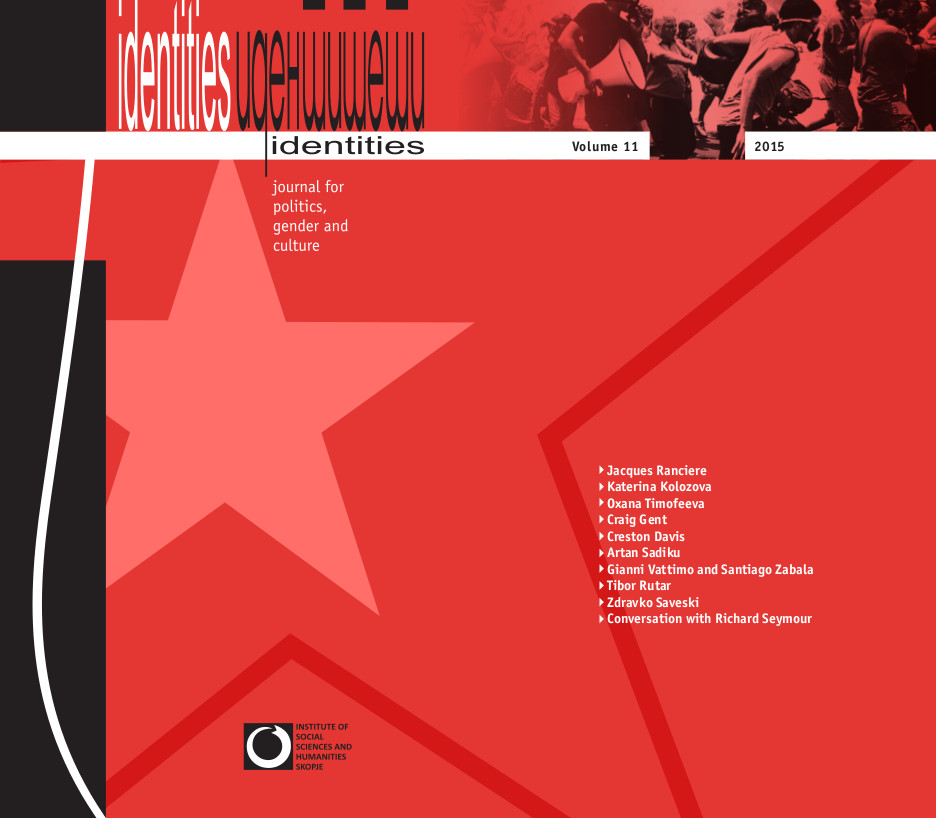Katerina Kolozova: Toward a Radical Metaphysics of Socialism: Marx and Laruelle (2015)
Filed under book | Tags: · alienation, automation, body, capitalism, cyborg, gender, marxism, metaphysics, philosophy, politics, socialism, technology

“Marx’s rigorously descriptive language unravels the radical core of capitalist economic processes and, through that unraveling, also reveals capitalism’s necessary exploitation and subjugation of human labor. Toward a Radical Metaphysics of Socialism attempts to recuperate and emancipate the notion of metaphysics in this scenario by virtue of radicalizing thought’s encounter with the Real. Kolozova argues that this metaphysical drama is at the origin of the social and economic injustices of contemporary global economic-political realities, and she illustrates this state of affairs in discussions of the problem of wage labor, automated speculation as the core of late capitalism, the post-2008 financial crisis, the status of technology in late capitalism, sexual difference and gender, and the human and non-human body’s subjugation capitalist automation.”
Publisher Punctum Books, Brooklyn/New York, August 2015
Creative Commons BY-NC-SA 4.0 License
ISBN 0692492410, 9780692492413
116 pages
Interview with author by Troy O’Neill
Publisher
Mikkel Bolt, Jakob Jakobsen (eds.): Cosmonauts of the Future: Texts from the Situationist Movement in Scandinavia and Elsewhere (2015)
Filed under book | Tags: · 1950s, 1960s, 1970s, art, capitalism, everyday, life, politics, scandinavia, situationists, spectacle

“This is the first ever English-language anthology collecting texts and documents from the still little-known Scandinavian part of the Situationist movement.
The book covers over three decades of writing, from Asger Jorn’s Luck and Chance published in 1953, to the statements of the Situationist Antinational set up by Jens Jørgen Thorsen and J.V. Martin in 1974. The writings collected gravitate around the year 1962 when the Situationist movement went through it’s most dynamic and critical moments, and the disagreements about the relationship between art and politics came to a culmination, resulting in exclusions and the split of the Situationist International.
The Situationists did not win, and the almost forgotten Scandinavian fractions even less so. The book broadens the understanding of the Situationist movement by bringing into view the wild and unruly activities of the Scandinavian fractions of the organisation and the more artistic, experimental, and actionist attitude that characterised them. They did, nevertheless, constitute a decisive break with the ruling socio-economic order through their project of bringing into being new forms of life. Only an analysis of the multifaceted and often contradictory Situationist revolution will allow us to break away from the dull contemplation of yet another document of Debord’s archive or yet another drawing by Jorn.
There is a lot to be learned from the history of revolutionary failure. It is along these lines that this book points forward beyond the crisis-ridden capitalist order that survives today.”
Texts by Asger Jorn, Jørgen Nash, Jens Jørgen Thorsen, Bauhaus Situationniste, Jacqueline de Jong, Gordon Fazakerley, Gruppe SPUR, Dieter Kunzelman, J.V. Martin, and Guy Debord.
Translated by Peter Shield, James Manley, Anja Buchele, Matthew Hyland, Fabian Tompsett, and Jakob Jakobsen
Publisher Nebula, Copenhagen, in association with Autonomedia, New York, May 2015
This book can be freely pirated and quoted except for the texts covered by copyrights.
ISBN 9788799365180 (Nebula), 9781570273049 (Autonomedia)
304 pages
Publisher (Nebula)
Distributor (Minor Compositions)
See also Bolt, Jakobsen (eds.), Expect Anything Fear Nothing: The Situationist Movement in Scandinavia and Elsewhere, 2011.
More on Situationists
Identities, Journal for Politics, Gender and Culture, 11: The Future of the Idea of the Left (2015)
Filed under journal | Tags: · capitalism, community, democracy, economy, left, marxism, metaphysics, philosophy, politics, theory

Identities “is a peer reviewed international journal that seeks to serve as a platform for the theoretical production of Southeastern Europe and enable its visibility and an opening for international debate with authors from both the ‘intellectual centers’ and the ‘intellectual margins’ of the world. It is particularly interested in promoting theoretical investigations which see issues of politic, gender and culture as inextricably interrelated.”
With contributions by Jacques Rancière, Katerina Kolozova, Oxana Timofeeva, Craig Gent, Creston Davis, Artan Sadiku, Gianni Vattimo and Santiago Zabala, Tibor Rutar, Zdravko Saveski, and Richard Seymour.
Edited by Katerina Kolozova and Žarko Trajanovski
Publisher Institute of Social Sciences and Humanities, Skopje, 2015
Open Access
ISSN 1857-8616
129 pages

